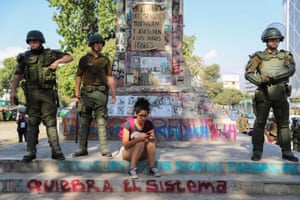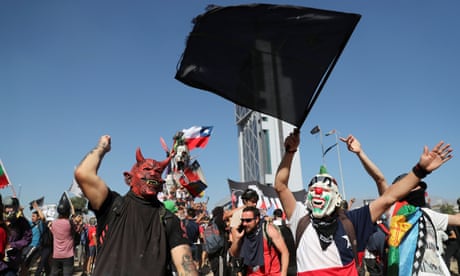Chile UPDATES
'Mentally, we're in crisis mode': protests leave Chileans living on their nervesChileans are gripped by uncertainty – suspended between hopes of progress, and frustration over an elusive political solution
John Bartlett in Santiago
Tue 17 Dec 2019
The Guardian


'The constitution of the dictatorship has died': Chile agrees deal on reform vote Read more
After an agreement last month between political parties, the country will next year hold a referendum on drafting a new constitution – one of the protesters’ main demands.
But widespread anger still simmers over inequality, social exclusion and the high cost of education and healthcare. Demonstrators continue to gather across the country every day, and violence often erupts at nightfall.
Chileans have found themselves in a state of uncertainty – suspended between hopes of progress, and frustration over a political solution which seems beyond reach

A woman uses her phone as security forces members look on in
Santiago, Chile, on 16 December 2019. Photograph: Iván Alvarado/Reuters
When a tsunami of unrest spilled into Santiago’s fashionable Bellavista neighbourhood in October, Daniel Gajardo, 33, was torn between sympathy for the protesters and frustration at the harm they were doing his fledgling business.
The recording studio and music shop he co-owns had been thriving, and moved to new premises just a day before the first major demonstration.
But then came a week-long curfew (during which their shop was burgled), an ongoing succession of demonstrations and street battles – and a 19-day wait before their next sale.
“I would sit in my office staring at my phone, but it didn’t ring for two weeks,” said Gajardo. “It’s been like starting from scratch because we have debts to pay without any income. This has hit us incredibly hard,” he said.
Two months after Chile lurched from an illusory clm to a fiery outburst of rage, there is still no sign that life is about to return to normal.
When a tsunami of unrest spilled into Santiago’s fashionable Bellavista neighbourhood in October, Daniel Gajardo, 33, was torn between sympathy for the protesters and frustration at the harm they were doing his fledgling business.
The recording studio and music shop he co-owns had been thriving, and moved to new premises just a day before the first major demonstration.
But then came a week-long curfew (during which their shop was burgled), an ongoing succession of demonstrations and street battles – and a 19-day wait before their next sale.
“I would sit in my office staring at my phone, but it didn’t ring for two weeks,” said Gajardo. “It’s been like starting from scratch because we have debts to pay without any income. This has hit us incredibly hard,” he said.
Two months after Chile lurched from an illusory clm to a fiery outburst of rage, there is still no sign that life is about to return to normal.

'The constitution of the dictatorship has died': Chile agrees deal on reform vote Read more
After an agreement last month between political parties, the country will next year hold a referendum on drafting a new constitution – one of the protesters’ main demands.
But widespread anger still simmers over inequality, social exclusion and the high cost of education and healthcare. Demonstrators continue to gather across the country every day, and violence often erupts at nightfall.
Chileans have found themselves in a state of uncertainty – suspended between hopes of progress, and frustration over a political solution which seems beyond reach
in Santiago on 12 November. Photograph: Claudio Santana/Getty Images
“In some ways, this protest has been a carnival and a liberation – bringing euphoria and an excess of emotions,” said psychoanalyst Constanza Michelson. “But for many people there is also creeping anxiety: human beings are not built to withstand such uncertainty. Mentally, it puts us in crisis mode.
“There’s a huge deficit in terms of mental healthcare in our country, and making people’s commutes longer and days more stressful is inevitably going to take its toll,” she said.
María Paz Núñez, 34, lives close to Santiago’s Plaza Italia, a focus of the protests, and has been given a leave of absence in order to deal with depression.
“Seeing my neighbourhood destroyed and graffitied, not having the metro – it all affects you, whether or not you agree with the demands of the movement as I do. Faced with a government that doesn’t listen, we are all left with this infuriating feeling of impotence.”
According to Chile’s health ministry, the number of people given medical leave from work citing mental health concerns increased 22% over the first five weeks of the protests.
In some parts of the country life has regained a degree of normality, but daily routines are still disrupted by transport stoppages, the near-paralysis of the university system, and pockets of vandalism and violence in parts of cities.
For many, the stress of each day is compounded by the financial impact of the protests: according to the government, nearly 15,000 businesses have been affected by the movement, more than half of which have suffered damage to their property.
Arson attacks have gutted historic buildings in cities the length of Chile, and there have been incidents of looting and opportunist crime.
Gajardo and his business partner Cristián Luengo have struggled to reconcile his enthusiasm for the movement with the damage it has inflicted upon their business, forcing them to cut their employees’ hours.
“The emotions are mixed,” said Luengo, “I was paranoid. Every night I sleep badly, worried that the phone will ring to say that our place has been looted. It’s the uncertainty that gets you in the end.”
Vast marches have become less frequent, but the undercurrent of rage that drove them has not yet dissipated. In downtown Santiago, the breeze still carries a whiff of teargas, and the statue of the 19th-century hero Manuel Baquedano in Plaza Italia remains a focal point for protesters
“In some ways, this protest has been a carnival and a liberation – bringing euphoria and an excess of emotions,” said psychoanalyst Constanza Michelson. “But for many people there is also creeping anxiety: human beings are not built to withstand such uncertainty. Mentally, it puts us in crisis mode.
“There’s a huge deficit in terms of mental healthcare in our country, and making people’s commutes longer and days more stressful is inevitably going to take its toll,” she said.
María Paz Núñez, 34, lives close to Santiago’s Plaza Italia, a focus of the protests, and has been given a leave of absence in order to deal with depression.
“Seeing my neighbourhood destroyed and graffitied, not having the metro – it all affects you, whether or not you agree with the demands of the movement as I do. Faced with a government that doesn’t listen, we are all left with this infuriating feeling of impotence.”
According to Chile’s health ministry, the number of people given medical leave from work citing mental health concerns increased 22% over the first five weeks of the protests.
In some parts of the country life has regained a degree of normality, but daily routines are still disrupted by transport stoppages, the near-paralysis of the university system, and pockets of vandalism and violence in parts of cities.
For many, the stress of each day is compounded by the financial impact of the protests: according to the government, nearly 15,000 businesses have been affected by the movement, more than half of which have suffered damage to their property.
Arson attacks have gutted historic buildings in cities the length of Chile, and there have been incidents of looting and opportunist crime.
Gajardo and his business partner Cristián Luengo have struggled to reconcile his enthusiasm for the movement with the damage it has inflicted upon their business, forcing them to cut their employees’ hours.
“The emotions are mixed,” said Luengo, “I was paranoid. Every night I sleep badly, worried that the phone will ring to say that our place has been looted. It’s the uncertainty that gets you in the end.”
Vast marches have become less frequent, but the undercurrent of rage that drove them has not yet dissipated. In downtown Santiago, the breeze still carries a whiff of teargas, and the statue of the 19th-century hero Manuel Baquedano in Plaza Italia remains a focal point for protesters
for demonstrators, such as here on 10 December.
Photograph: Pablo Sanhueza/Reuters
Some who joined the demonstrations on 18 October have drifted away from confrontations in the street to resume everyday commitments.
Others remain fully committed.
Every day Camilo, a 20-year-old student in the sprawling coastal city of Valparaíso trudges down the hill from his parents’ house to join the ranks of the discontented.
Pulling a black T-shirt over his face, he sprays slogans on walls, helps build makeshift barricades across roads and attacks buildings and infrastructure.
“I know that smashing a bus shelter or traffic light won’t change anything – but it exerts pressure and that makes a difference. It’s a way of letting the anger inside me out,” he said.

Chile security forces' crackdown leaves toll of death and broken bodies Read more
“When the teargas comes, people help us, washing out our eyes with bicarbonate of soda to soothe the stinging,” he said. “When I’m out there I’m part of a family … You know that you are beside someone who is suffering the same inequalities as you.”
Chileans have not been appeased by solutions offered by mainstream politicians; the government’s approval rating has slumped to around 10%
On Sunday, 2 million Chileans voted in a non-binding consultation which showed that 91% of respondents were in favour of drawing up a new constitution.
But as the protest movement stutters, those who had pinned their hopes on dramatic change may find that the eventual comedown will be severe, said Michelson.
“In the past, people didn’t have a cause to identify with – but they certainly do now,” she said. “How and why would they return to how life was before? They’re in too deep.”
Some who joined the demonstrations on 18 October have drifted away from confrontations in the street to resume everyday commitments.
Others remain fully committed.
Every day Camilo, a 20-year-old student in the sprawling coastal city of Valparaíso trudges down the hill from his parents’ house to join the ranks of the discontented.
Pulling a black T-shirt over his face, he sprays slogans on walls, helps build makeshift barricades across roads and attacks buildings and infrastructure.
“I know that smashing a bus shelter or traffic light won’t change anything – but it exerts pressure and that makes a difference. It’s a way of letting the anger inside me out,” he said.

Chile security forces' crackdown leaves toll of death and broken bodies Read more
“When the teargas comes, people help us, washing out our eyes with bicarbonate of soda to soothe the stinging,” he said. “When I’m out there I’m part of a family … You know that you are beside someone who is suffering the same inequalities as you.”
Chileans have not been appeased by solutions offered by mainstream politicians; the government’s approval rating has slumped to around 10%
On Sunday, 2 million Chileans voted in a non-binding consultation which showed that 91% of respondents were in favour of drawing up a new constitution.
But as the protest movement stutters, those who had pinned their hopes on dramatic change may find that the eventual comedown will be severe, said Michelson.
“In the past, people didn’t have a cause to identify with – but they certainly do now,” she said. “How and why would they return to how life was before? They’re in too deep.”
---30---
“In some ways, this protest has been a carnival and a liberation – bringing euphoria and an excess of emotions,” said psychoanalyst Constanza Michelson.



No comments:
Post a Comment